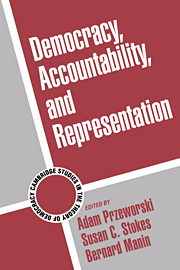
-
Select format
-
- Publisher:
- Cambridge University Press
- Publication date:
- 05 June 2012
- 13 September 1999
- ISBN:
- 9781139175104
- 9780521641531
- 9780521646161
- Dimensions:
- (228 x 152 mm)
- Weight & Pages:
- 0.7kg, 364 Pages
- Dimensions:
- (228 x 152 mm)
- Weight & Pages:
- 0.505kg, 364 Pages
You may already have access via personal or institutional login- Series:
- Cambridge Studies in the Theory of Democracy (2)
Book description
This book examines whether the mechanisms of accountability characteristic of democratic systems are sufficient to induce the representatives to act in the best interest of the represented. The first part of the volume focuses on the role of elections, distinguishing different ways in which they may cause representation. The second part is devoted to the role of checks and balances, between the government and the parliament as well as between the government and the bureaucracy. The contributors of this volume, all leading scholars in the fields of American and comparative politics and political theory, address questions such as, whether elections induce governments to act in the interest of citizens. Are politicians in democracies accountable to voters in future elections? If so, does accountability induce politicians to represent citizens? Does accountability limit or enhance the scope of action of governments? Are governments that violate campaign mandates representative? Overall, the essays combine theoretical discussions, game-theoretic models, case studies, and statistical analyses, within a shared analytical approach and a standardized terminology. The empirical material is drawn from the well established democracies as well as from new democracies.
Reviews
"In an introductory essay to Democracy, Accountability, and Representation, Przeworski, Stokes, and Manin helpfully lay out a set of definitions for thinking about mass-elite linkages." Comparative Politics, Andrew Roberts, The Quality of Democracy
Contents
Metrics
Altmetric attention score
Full text views
Full text views help Loading metrics...
Loading metrics...
* Views captured on Cambridge Core between #date#. This data will be updated every 24 hours.
Usage data cannot currently be displayed.
Accessibility standard: Unknown
Why this information is here
This section outlines the accessibility features of this content - including support for screen readers, full keyboard navigation and high-contrast display options. This may not be relevant for you.
Accessibility Information
Accessibility compliance for the PDF of this book is currently unknown and may be updated in the future.


